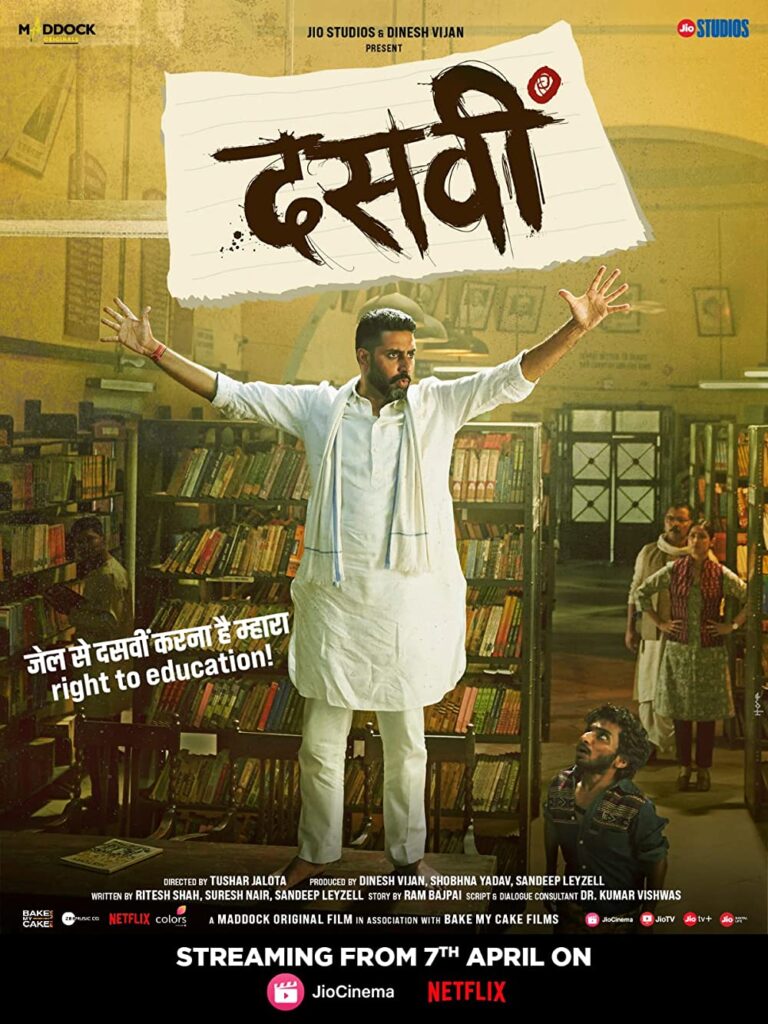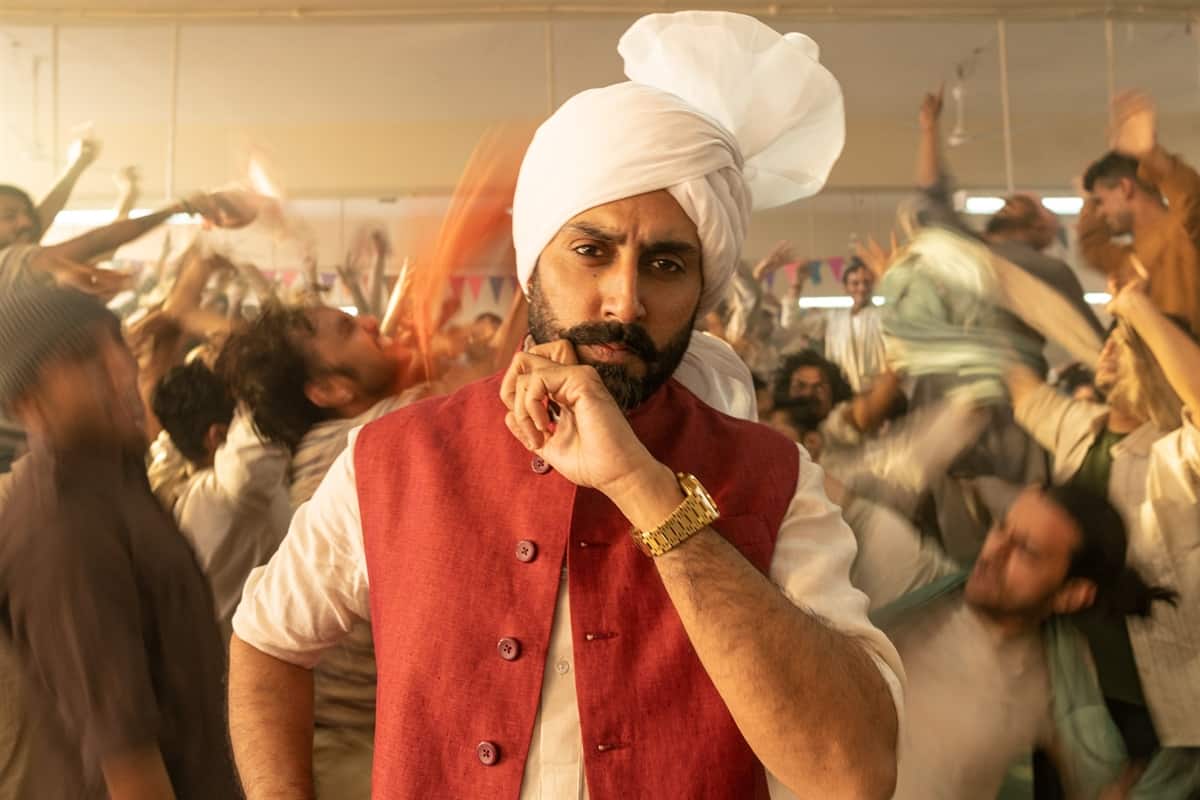Help keep The Curb independent by joining our Patreon.
It’s not difficult to see Dasvi, the latest Maddock Films production, as a response to the ultra-religious ultra-nationalist political climate of India under its current government and ruling party. At one point, the antagonist calls our hero anti-nationalist. At another point, they spit “Bloody liberal” at someone else. I was slightly taken aback both times but then I shouldn’t have been since I rather admire the sheer gutsiness and relentless focus of Maddock in making socially charged films. Even when the material is less than stellar, their messages are super clear and always aimed towards inclusivity.
Luckily, here the material is pretty good. Our hero is Ganga Ram Chaudhary (Abhishek Bachchan), a head of state politician who is sent to jail for a teacher scam, and there decides to study for his high school diploma. To me, it was the tenth standard exam, but in Hindi it’s dasvi. Chaudhary’s initial goal is to dodge woodworking duties but then he sees how to turn the pursuit of the diploma to his political and public advantage. He has appointed his wife, Bimla Devi (Nimrat Kaur), as proxy head of state, which I’m assuming is a real thing and not a filmi invention. While she comes into her own power outside, Chaudhary enlists the help of fellow inmates and the jail librarian and eventually the superintendent in his studies. And so this cynical pollie discovers his own evolution and empowerment.
There’s far too much repetition in the dialogue of the first half but ooh, when Chaudhary really engages with his learning, then the film gets very interesting. The script makes wonderful use of Taare Zameen Par (2007), that seminal film about the Indian education system that had everyone crying floods, and a focus on different teaching techniques, on the specificity of teacher adapting to student rather than hammering knowledge like in my day of rote learning. (Though admittedly that worked pretty well for me so I ain’t complaining.) Of course such specificity is also a massive luxury because focused teaching techniques aren’t available to every kid in every school, no matter what country and population size.
I was pleasantly shocked at the inclusion and really respectful treatment of a character of short stature. Ghanti (Arun Khushwaha) is the first person to earn Chaudhary’s respect, and his influence carries through the whole film, even if he isn’t always onscreen. Of course that goes along with the sight gag of super lumbi Abhishek Bachchan standing next to a little person, but I was relieved that the filmmakers avoided the humiliation that would have been rife in previous decades of desi and international cinema.

Likewise, I appreciated how yet again a Maddock production included an anti-casteism subplot, with a bitterly hilarious coda of a journo reporting on the incident and then asking the guy who brings him water about his caste. I might have laughed and swore in Hindi at the screen.
Abhishek Bachchan’s performance as Chaudhary gets better and better as the film goes on. I didn’t like the overtness of his acting at the start even though I realised that was the character’s bravado more than Abhi being a bad actor because I know he’s not. But then my gosh, he gets so wonderful in the second half, when the façade falls away and Chaudhary’s interactions become genuine. There’s a depth and sweetness and humility to his evolution that is simply heartwarming and not overdone in the slightest. What I loved best was the frustration: it felt so important to see that yes, even someone as privileged and famous as Abhishek Bachchan, Bollywood royalty, can struggle with learning onscreen. The image felt so powerful. And I loved that they gave Chaudhary Abhi’s actual birthdate. More of these kind of roles for him, please.
Chaudhary’s engagement with desi historical figures was particularly touching. No doubt it comes off as hokey and gimmicky to plenty of viewers but personally, that’s why and how I loved history, too. How vivid those stories were, the pain and joy of the freedom struggle, the trauma of the atrocities, the sheer indignity of the Raj, the mythic glory of the previous eras veiled in glamour and so much riches. And whether they were true or not, how much that instilled a self-assurance in me that works to this day, particularly when interacting with condescending white people.
Admittedly, it didn’t escape me that all those historical figures were men, both in the film and in my own education. Which conversely made the female characters in this quite intriguing. (Spoilers at end of review.)
The superintendent, Jyoti Deswal, is an excellent character: she retains her strength and independence through the whole film instead of turning into a soppy female devotee only there to serve Chaudhary. Even though we don’t see anything of her personality beyond her interactions with him, there’s no doubt that her life is way more than him, that she’d actually laugh at the idea. Yami Gautam does so well in the role, keeping her character’s integrity and cleverness visible even as the friendship develops. She impresses me every time I see her onscreen.
Nimrat Kaur has so much fun as Bimla; it’s obvious she relishes the opportunity to play meekness coming into power and cockiness, the cowering wife turning into this delightfully manipulative dangerously smart character who gains a slightly disappointing sense of wisdom at the end. The changing of her hair and wardrobe is marvellous: she goes from traditional with covered hair to aviator sunnies and her hair pinned back in bouncy waves, wearing super classy saris with hilariously white sneakers, all very recognisable style flourishes of a desi woman of a certain age.
The costume choices for every character are so interesting. Chaudhary’s kurtas are always immaculately pressed and steamed, always in solid colours, always cut and tapered perfectly to Abhi’s tall lean shape, the lines elegant and classic desi politician. Whereas Jyoti goes from the distinctly unattractive uniform to ensembles that still look formal but always patterned to contrast his simplicity. Chaudhary’s brother always has a leather jacket over the kurta patloon, to signify that he tries much harder to be cool. Even Ghanti is so cool with his jeans and shirts and his highlighted hair. In previous decades, his clothes would have further served to make him look ridiculous but here he seems quite stylish and individual. Everyone’s hair is perfect, an added little implication that Chaudhary gets his styled and trimmed regularly in jail. I loved the twisted ropes and muted jewel colours of his turbans, and the two rings he wears, one pearl and one brass – all character details assembled with wonderful subtlety to create the image of a politician hero. Likewise, Bimla’s sari at the end is in a subdued blue with touches of soft gold to match the political party colours.
The main song gets a little obnoxious in its various reprises but I appreciated the momentum and energy it brought to the sedentary visuals of a guy poring over books. There’s a wonderful little montage of schoolkids revising exam notes in buses and rickshaws and on steps, dropping their bags outside doors before going into the classrooms, which brought that time so vividly back to me. The cinematography draws no attention to itself, the colour palette deliciously cool and no less beautiful. It’s one more example of technical craft in a Hindi film that makes me grateful all over again that Netflix India exists and that we overseas desis get to watch these films too. Legally, even.
If I knew more about the specifics of Indian politics, I’d probably get a lot more out of the specific references in this film. But the message itself is cleverly managed – Chaudhary’s education includes both Hindi and English exams, and we see him learning from both Hindi and English books. Which to me is in pointed defiance of both Hindu nationalism and the movement a few years ago for state-based education in regional language. It certainly reminded me of being told by a relative exactly why a curriculum only in a regional language was a stupid dangerous idea, and why English needs to be included in the syllabus despite nationalist calls to the contrary.
Another interesting aspect was that Chaudhary’s studies include evolutionary science, but there’s also a sly incorporation of religion in his final triumphant speech promoting education. It really speaks to the particular blend of both in Indian society, the intricate negotiation of faith and knowledge that in other parts of the world are in total opposition. I was fully shocked when Chaudhary said: “God wants us to question him.” Like woah, what? I can’t believe that came out of the mouth of an Indian person on film. That rejection of blind faith in appeal to both secularist and believer is so brave and so wonderful, and I love Maddock for going that way.
Dasvi is a fairly light-hearted film relevant to a moment in Indian time and might be a little bewildering to those of us, desi or not, who take education for granted. Then again, the past two years of pandemic misinformation and wilful ignorance has reiterated the importance of fact-based knowledge and the need for critical analysis. I will also admit to the thrill of hearing the two words “free education.” Definitely more of that, please.
Director: Tushar Jalota
Cast: Abhishek Bachchan, Bablu Baghel, Mubashir Bashir Beigh
Writers: Suresh Nair, Ritesh Shah
SPOILERS
For a long while, it seems like the film villainises women entering politics and finding their own power. The ending reverts to the disappointing notion that a wife’s place is in the home and not in office, devoted to her marriage vows and her husband instead of her country and her own ambition. Yet I can’t help thinking the overall point about education might negate that. Bimla would totally educate herself and become just as empowered as Chaudhary and probably get back into politics on her own. Only we don’t get to see that, you need to project beyond the end of the film for that.
But oh I did love that their marriage survives the conflict, that the romantic possibility set up with Jyoti remains as friendship and very much one of respectful student-teacher. It’s a wonderfully mature, if slightly bizarre, look at heterosexual relationships.



